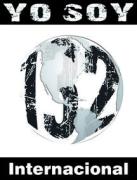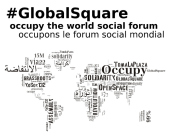[ESP/ENG]
Si pensamos en el conocimiento y la acción de un movimiento mundial como el de los indignados, pronto advertimos que hay problemas teóricos y prácticos considerablemente distintos a los que se plantean en la academia, en los partidos y los gobiernos. Afortunadamente tenemos la posibilidad de enriquecer nuestro conocimiento con las preguntas que los pueblos se hacen y con las respuestas que se dan.
Teorías y prácticas que vienen de abajo y a la izquierda tienen la originalidad de criticar al poder cuando éste se siente distinto de la sociedad y cuando se separa de la sociedad.
Los nuevos movimientos del pueblo plantean una democracia que corresponda a las decisiones del pueblo, y que en caso de que se separe del pueblo dejará de ser democracia.
Depauperados y excluidos, indignados y ocupas formulan teorías que contienen un gran respaldo empírico. Se trata de explicaciones y generalizaciones basadas en gran cantidad de experiencias. Se trata de conocimientos, de artes y técnicas que corresponden al saber y al hacer de los pueblos, ese saber que tanto exaltara el antropólogo Andrés Aubry, y en que aparece, en vez del yo individualista, el nosotros tojolabal que Carlos Lenkersdorf rescatara para la filosofía de la solidaridad humana.
Teorías y prácticas tienen mucho de particular y también de universal… Y no exagero. Pensemos en la inmensa movilización de los indignados y los ocupas que luchan por otro mundo posible. Hoy –escriben admirados dos profesores ingleses–, la movilización es gigantesca. Nunca se había dado una de esa magnitud, y toda la movilización empezó (añaden) en las junglas de Chiapas con principios de inclusión y de diálogo.
Vemos así que desde abajo y a la izquierda y desde las selvas tropicales surge un movimiento que no sólo lucha por defender los derechos de los pueblos indios, sino por la emancipación de los seres humanos.
Y ese movimiento universal, en medio de sus diferencias, vive problemas parecidos. Es más, encuentra soluciones parecidas para la creación de otro mundo y de otra cultura necesaria, a la que los pueblos de los Andes expresan como el bien vivir, en que el vivir bien de unos no dependa del mal vivir de otros.
A esas aportaciones que de los indios de América vienen se añaden muchas más que corresponden a las experiencias de múltiples culturas e historias y que crean la historia universal de la lucha por la libertad, por la justicia y por la democracia, lema que levantó el movimiento zapatista y que anda por el mundo entero no como eco sino como las voces de un pensar y querer parecido.
Y allí están las juventudes griegas que luchan contra el tributo de la deuda externa, están los movimientos de la primavera árabe a quienes los militares no pueden transar, están las asambleas de los indignados españoles que articulan intereses vitales que el sistema no puede satisfacer, están los jóvenes estadunidenses que ocupan Wall Street como centro del poder corporativo contra el que todos luchamos, a los jóvenes chilenos que dan su vida para que no les quiten sus escuelas y universidades.
En todas las movilizaciones hay mucho de común. Todas o casi todas coinciden con lo incluyente y con lo dialogal, y un número cada vez mayor, con la idea de que el capitalismo corporativo es el origen de todos los problemas que afectan y amenazan a la humanidad.
Coinciden también en que la solución es esa democracia de todos para todos y con todos que no se delega, y que algunos llaman socialismo democrático y socialismo del siglo XXI y otros nomás democracia, y que es eso, y mucho más, pues es una nueva forma de relacionarse con la tierra y con los seres humanos… una nueva forma de organizar la vida.
Y es en medio de la riqueza y novedad de esta movilización mundial como se captan una serie de reflexiones que vienen de abajo y a la izquierda y cuya respuesta busca el triunfo de los indignados y de los pobres de la tierra.
La riqueza de las reflexiones y llamados es enorme y exige la atención la profundización de algunos que enuncio escuetamente y en los que debemos trabajar más:
1. El llamado a perder el miedo antes que nada, que el movimiento zapatista destacó como un requisito para pensar y actuar.
2. El no pensar sólo en qué hacer sino en cómo lo hacemos.
3. El precisar con quiénes –lo hacemos– en las distintas circunstancias.
4. El aclarar nuestras diferencias internas con un nuevo estilo de discutir y acordar.
5. El rechazar terminantemente la lógica de la caridad. Y también la lógica del paternalismo, pues ambas ocultan la manipulación. Caridad y paternalismo son la cara buena de la cultura autoritaria.
6. Combinar la lucha por los derechos de los pueblos, los trabajadores y los ciudadanos con la lucha por la construcción de una sociedad alternativa en que los colectivos de los buenos gobiernos practiquen el mandar obedeciendo. Precisar con ejemplos en qué consiste la práctica del mandar obedeciendo.
7. Dar los pasos necesarios para que el proyecto emancipador sea realmente incluyente, y dé lugar a un trato respetuoso de las diferencias de raza, sexo, edad, preferencia sexual, religión, ideología y nivel educativo.
8. Redefinir los conceptos de la libertad, la igualdad, la fraternidad, la justicia, la democracia… Redefinirlos en la vida cotidiana, en el aquí y el ahora.
9. Aclarar que las redes no son sólo redes informáticas. Aclarar que se han organizado y se van a organizar redes de colectivos y de sistemas de colectivos que permitan el predominio de las organizaciones horizontales sobre el mercado y el Estado, que estimulen la cooperación y la solidaridad frente al individualismo del mercado, y en que los encargados manden obedeciendo los lineamientos que las organizaciones horizontales les den y no se sientan ni un minuto por encima de ellas. Al mismo tiempo crear organizaciones centralizadas y descentralizadas, como el EZLN, o como las policías de los pueblos del sureste y como las autonomías municipales.
10. Profundizar y promover los sistemas solidarios y cooperativos con flujos e intercambios que acerquen la producción, el consumo y los servicios, por ejemplo, la educación, salud, seguridad social.
11. Actualizar constantemente los conocimientos sobre las contradicciones en los propios movimientos emancipadores, y no sólo sobre las contradicciones externas.
12. Fomentar el respeto a la dignidad y a la identidad de personas y pueblos, sin caer en el individualismo o el aldeanismo, y antes cultivando la emancipación universal.
13. Combatir el maniqueísmo, y retomar el tipo de discusiones que invocan a los clásicos para comprender el aquí y el ahora, e incluir sus narrativas y reflexiones en la memoria creadora de nuestras generalizaciones.
14. Reconocer que en todos los grandes movimientos los pueblos –con una razón de enorme peso– no se inclinan por una revolución violenta, sino por la ocupación pacífica y multitudinaria de la sociedad y de la tierra.
15. Pensar que 99 por ciento de la humanidad va a ganar esta lucha y que de su triunfo y de la sociedad que construya dependerá la creación ecológica de un sistema terrestre sostenible, capaz de satisfacer las demandas vitales de una población creciente que hoy sufre hambre y frío por cientos de millones, y capaz de impedir que continúe un sistema económico-político en que la industria de guerra es el motor principal de la economía.
16. Plantear cómo se lucha y gana pacíficamente en una guerra de espectro amplio como la diseñada por el Pentágono. Si uno de los espectros es la guerra violenta y armada, podemos luchar en los otros que comprenden la guerra informática y cibernética, la guerra contra la educación, la guerra contra la cultura, la guerra económica con la deuda externa y derivados, la guerra social que deshace el tejido comunitario, familiar, de clase; la guerra ideológica y seudo-científica neoliberal, cínica, recolonizadora y neofascista: la guerra que destruye la biosfera y la guerra que siembra el terror acompañadas de la guerra inmoral para cooptar, macro-corromper y someter a una humanidad que se rinda y se venda.
17. Insistir en que los pobres de la tierra y quienes estamos con ellos debemos enfrentar la guerra de espectro amplio en todos los espectros pacíficos posibles: en el terreno de la educación para pensar y hacer, en el terreno de la economía de la resistencia que cuida el pan y el agua, el fogón y el techo, los servicios de salud y de seguridad: el tejido social de la familia y el de la comunidad, y el de una clase trabajadora que restructure la unión necesaria de los trabajadores regulados y desregulados; en la lucha ideológica contra las corporaciones, los líderes amarillos y las mafias que ocultan su guerra depredadora con otras guerras no menos infames –como las del terrorismo, el narcotráfico y la confusión… Y estar cada vez más conscientes de que la guerra actual de intimidación y corrupción busca sobre todo el despojo de los territorios comunales, de las parcelas campesinas, de las tierras nacionales, de los bosques y las minas, de los viveros de petróleo y de los mantos acuíferos; de los suelos y los subsuelos, de las costas y las tierras. Y no conforme con oprimir a los pobres entre los pobres y a los habitantes de la periferia mundial, en forma cada vez más abierta está empobreciendo a los sectores medios y privando de sus derechos y de su futuro a los jóvenes y los niños del mundo entero.
Con los indignados de la tierra hemos de enfrentar la nueva política del azúcar y el garrote, de la corrupción y la represión macroeconómica que emplea el capitalismo corporativo, con sus aliados y subordinados. Frente a sus intentos de intimidación y corrupción universal blandiremos la moral de lucha y el coraje de los pueblos. Lo haremos, conscientes de que somos cada vez más y de que serán cada vez más quienes en el mundo entero luchen por lo que en 1994 sólo parecía ser una rebelión indígena posmoderna y que en realidad es el principio de una movilización humana considerablemente mejor preparada para lograr la libertad, la justicia y la democracia a que todos aspiramos.
Pablo González Casanova
[ENG]
If we consider the knowledge and actions of a worldwide movement such as the “indignados”, we soon notice theoretical and practical problems considerably different from those raised within academia, parties or governments. Fortunately, we have the opportunity to enrich our knowledge through the questions people ask and the answers they are given.
Theories and practices that come “from below and to the left” genuinely criticize power, when it is seen as different from society, and when it is separate from society.
The new peoples’ movements propose a democracy that corresponds to the decisions of the people, and that if it becomes distant from the people, it ceases to be a democracy.
Impoverished and excluded “indignados” and “Occupy movements” formulate theories that contain strong empirical support. These consist of explanations and generalizations, based on a great quantity of experience. Knowledge, arts and techniques that correspond to the knowledge and the ways of being of the people; that knowledge which the anthropologist Andrés Aubry so exalts, in which, instead of the individualistic “I”, the Tojolabal “we” appears, that concept rescued by Carlos Lenkersdorf for the philosophy of human solidarity.
Theories and practices have much of the particular and also of the universal …And I do not exaggerate. Think of the huge “indignado” and “Occupy” mobilizations which are struggling for another possible world. Today –two admired English professors write–, the mobilization is gigantic. Never before has one of this magnitude been presented, and all the mobilizations (they add) “began in the jungles of Chiapas with the principles of inclusion and dialogue”.
Thus we see that “from below and to the left”, and from the tropical forests, a movement is arising that not only fights to defend the rights of indigenous peoples, but also for the emancipation of all human beings.
And this universal movement, amidst all its differences, faces similar difficulties. Moreover, it finds similar solutions through the creation of another world and another culture, so badly needed, which the peoples of the Andes call “living well”, whereby “the wellbeing of some does not rely on the bad living of the rest”. (el vivir bien de unos no dependa del mal vivir de otros”.
To the contributions provided by the American Indians, many more are added, corresponding to the experiences of different cultures and histories, which all make up the world history of the struggle for freedom, justice and democracy; the slogan the Zapatista movement uses walks through the whole world, not as an echo, but as the voice of the same thoughts and desires.
And there are the Greek youth fighting against the tribute of foreign debt; the movements of the Arab spring that the military cannot force to compromise; the Spanish “indignado” assemblies that articulate vital interests that the system can not satisfy; the young Americans occupying Wall Street as the centre of corporate power we all struggle against; the young Chileans who give up their lives so their schools and universities are not taken away.
In all these demonstrations there is a lot in common. All, or almost all, agree with “inclusiveness” and “dialogue” and, in increasing numbers, with the idea that corporate capitalism is the source of all the problems that affect and threaten humanity.
They also agree that the solution is democracy from everyone, for everyone, and with everyone, which is not delegated; some call it democratic socialism or the socialism of the 21st century, and others just call it democracy; and it is that and much more, it is a new way of relating to the earth and human beings … a new way of organizing life.
And it is in the midst of the richness and novelty of this global movement that a series of reflections coming from below and to the left have been understood, and a response arises seeking the triumph of the indignados and the poor of the earth.
The richness of the reflections and calls is huge; it demands attention, and a deepening study; I here list briefly some of these calls which we must now work on:
1. Above all the call to lose fear, which the Zapatista movement has highlighted as a requirement for thought and action.
2. To not only think of “what to do”, but “how we do it”.
3. Setting out with whom -we do it- in the different circumstances.
4. To clarify our internal differences with a new style for discussion and agreement.
5. The complete rejection of the logic of charity. And also the logic of paternalism, as both of them disguise manipulation. Charity and paternalism are the good side of the authoritarian culture.
6. Combining the struggle for the rights of the peoples, workers and citizens with the struggle to build an alternative society in which good government collectives practice “governing by obeying”. Give detailed examples to clarify what constitutes the practice of governing by obeying. (mandar obediciendo)
7. Take the necessary steps for the project of emancipation to be truly inclusive, and to provide a space for the respectful treatment of differences in race, sex, age, sexual orientation, religion, ideology and level of education.
8. Redefine the concepts of liberty, equality, fraternity, justice, democracy … Redefine them in everyday life here and now.
9. Clarify that networks are not only networks of information. Clarify that networks of collectives and of collective systems have been and will be organized, which will: enable horizontal organizations to predominate over the market and the state, encourage cooperation and solidarity against the individualism of the market, and allow those responsible for governing by obeying to follow the guidelines set by horizontal organizations and never even for one minute to feel above them. At the same time create centralized and decentralized organizations, like the EZLN, like the police from the people of the southeast, and like the municipal autonomies.
10. Deepen and promote solidarity and cooperative systems through flows and exchanges that bring production, consumption and services closer together, eg education, health, social security.
11. Constantly update knowledge about contradictions within the emancipation movements themselves, and not only update about external contradictions.
12. Encourage respect for the dignity and identity of individuals and peoples, without falling into individualism or provincialism, and before cultivating universal emancipation.
13. Combat Manichaeism [belief in religious or philosophical dualism], and renew the type of discussions that invoke the classics to understand the here and now, and include their narratives and reflections in the creative memory of our generalizations.
14. Recognize that, in all great movements, the people – for reasons of enormous importance – do not favour violent revolution but massive peaceful occupations of society and the earth.
15. Realise that the 99 per cent of humanity is going to win this struggle, and that its triumph, and the society that will be built, will depend on the ecological creation of a sustainable land system, able to meet the vital demands of a growing population when currently hundreds of millions suffer from hunger and cold, and able to prevent the continuation of an economic and political system in which the industry of war is the main engine of the economy.
16. Identify how to fight and win peacefully in a “broad spectrum” war, as designed by the Pentagon. If one of the “spectrums” is an armed and violent war, we can fight in the others, which cover information technology and cyber war, the war on education, the war on culture, the economic war with foreign debt and derivatives, the social war which destroys the fabric of the community, family and class; the pseudo-scientific and ideological neoliberal war, cynical, re-colonizing and neo-fascist: the war that destroys the biosphere, and the war that sows terror and which accompanies the immoral war intended to co-opt, macro -corrupt and subject a human race which has given up and sold out.
17. Insist that the poor of the earth and those who are with them must challenge the broad-spectrum war in all possible peaceful spectrums: in the realm of education to think and do, in the realm of the economics of resistance that takes care ofbread and water, home and hearth, services of health and security: the social fabric of family and community, and of a working class that rebuilds the essential union of regulated and unregulated workers; in the ideological struggle against the corporations, the yellow leaders and the gangs who hide their predatory war behind other no less infamous wars – like those against terrorism, drug trafficking and confusion … And to be ever more aware that the current war of intimidation and corruption seeks above all the plunder and dispossession of the communal lands, the farmers’ fields, the national lands, of the forests and mines, the oil reserves and groundwater, the soil and subsoil, the coasts and land. And not satisfied with oppressing the poorest of the poor and the inhabitants of the margins of the world, they are more and more openly impoverishing the middle class and depriving them of their rights, and the youth and children of the world of their future.
Alongside the outraged (indignados) of the earth we must stand against the new policy of the carrot and the stick, of corruption and macroeconomic repression that corporate capitalism employs, with its allies and subordinates. Against their plans of intimidation and universal corruption, we will brandish the moral struggle and the courage of the people. We will do it, we know that there are more of us all the time, and that more and more people throughout the world are now struggling for what in 1994 seemed to be only a “post-modern indigenous rebellion”, but in reality was only the beginning of a human mobilization considerably better prepared to achieve the liberty, justice and democracy we all deserve.
Pablo González Casanova















Leave a comment